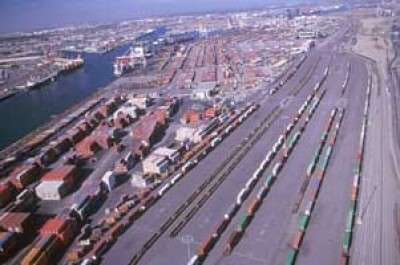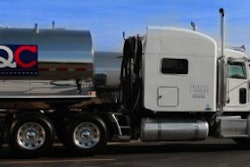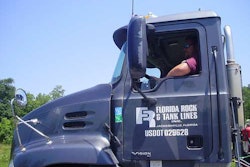
The debate over the Port of Los Angeles’ effort to ban drayage truck owner-operators is not about clean air or reducing the environmental footprint at the Ports of Los Angeles and Long Beach, an American Trucking Associations official testified Wednesday, May 5, before a U.S. House subcommittee. Robert Digges Jr., vice president and chief counsel, testified before the House Transportation and Infrastructure, Subcommittee on Highways and Transit during a hearing entitled “Assessing the Implementation and Impacts of the Clean Truck Programs at the Port of Los Angeles and the Port of Long Beach.”
Digges said ATA initiated litigation against the Ports of Los Angeles and Long Beach challenging their use of mandatory concession agreements to implement their respective Clean Truck Programs. “Our aim then and now is not to block or hinder implementation of the truck retirement-clean air portions of these programs,” he said. “What we are opposing is the banning of the independent contractor business model at the port as well as the mandated use of a concession contract by which the port grants to itself discretion to decide which otherwise federally qualified motor carriers can participate in port transportation services.”
The Clean Trucks Programs at the Ports of Los Angeles and Long Beach has reduced truck pollution by 80 percent almost three years ahead of schedule, and more than 6,500 clean trucks now are serving the ports. “Even though the retired trucks are permitted to operate everywhere else in the country, the trucking industry has supported their early retirement at the ports – underscoring our commitment to improving air quality in the maritime transportation-container trades sector,” Digges said.
The Port of Long Beach, which never included a ban on owner-operators and reached a settlement with the trucking industry in October 2009, replaced its concession agreement with a motor carrier registration process that requires trucking companies to register with the port and agree to provide certain operational information to assist the port in monitoring motor carrier compliance with various safety, environmental and security regulations pertaining to drayage services. “Long Beach is implementing a Clean Truck Program identical to that of Los Angeles without disrupting the entire drayage market, while at the same time establishing tough enforcement of existing laws that will protect the port’s environmental, safety and security interests,” Digges said.
The U.S. Court of Appeals ruled in 2009 that banning owner-operators from ports likely violates federal law, and the court also rejected the claim from the Port of Los Angeles, the National Resources Defense Council and several other groups that a ban on owner-operators was needed to help the port achieve its environmental and safety goals. Following the court’s ruling, Snyder in April 2009 enjoined principal elements of the Ports of Los Angeles and Long Beach’s concession requirements, including Los Angeles’ owner-operator ban, driver hiring preferences, motor carrier financial capability requirements and designated routes and off-street parking restrictions. On Feb. 24, the court upheld aspects of the Port of Los Angeles’ concession agreements with trucking companies; the three-judge panel’s decision allowed the concession agreements that the port says pertain to motor vehicle safety.
ATA’s lawsuit against the Port of Los Angeles completed oral arguments on Thursday, April 29. The trial, which started April 20 in Los Angeles, drew to close with Judge Christina Snyder touring the Port of Los Angeles. Both parties will have the opportunity to file written arguments until May 14. In the lawsuit, ATA asserts that the Port of Los Angeles Concession Plan is preempted by federal statute – specifically, F4A – 49 U.S.C. § 14501(c)(1), which states that a political subdivision of a state “may not enact or enforce a law, regulation, or other provision having the force and effect of law related to a price, route, or service of any motor carrier.”
The concession plan on its face controls access to the port drayage market, and many of its provisions will have a major impact on motor carrier rates and services, Digges said. “The port’s entire justification for the independent contractor ban is based on the false premise that motor carriers lack accountability for the safe operation of owner-operator drivers and their trucks,” Digges said. “The port refuses to acknowledge that under the federal safety regulatory scheme – which the port police can fully enforce – motor carriers have identical accountability and safety responsibility for owner-operators and their trucks as they do for employee drivers and company owned trucks. If the port is legitimately worried about truck safety, all they have to do is enforce the existing law and because they have a perfect enforcement environment, with controlled gate access for each truck and driver.”
John Holmes, Los Angeles port deputy executive director, testified that the employee requirement is necessary to enforce program accountability and sustain it.











